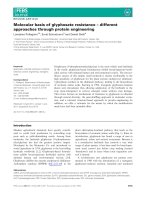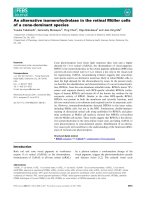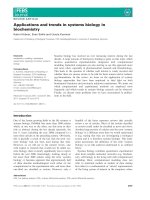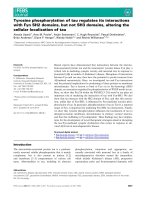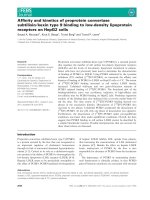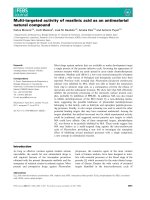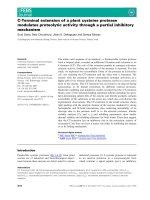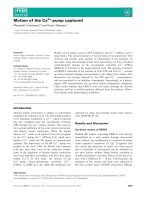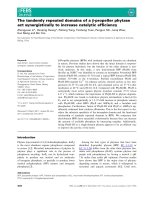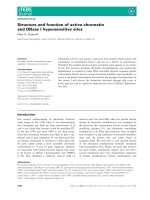Tài liệu Báo cáo khoa học: "PROSPECTS OR PRACTICAL NATURAL LANGUAGE SYSTEMS" potx
Bạn đang xem bản rút gọn của tài liệu. Xem và tải ngay bản đầy đủ của tài liệu tại đây (107.77 KB, 2 trang )
PROSPECTS mOR PRACTICAL NATURAL LANGUAGE SYSTEMS
Larry R. Harris
Artificial Intelligence Corporation
Newton Centre, ~ass. 02159
As the author of a "practical" NL data base
query system, one of the suggested topics for
this panel is of particular interest to me.
The issue of what hurdles remain before NL
systems become practical strikes particulary
close to home. %s someone with a more
pragmatic view of NL processing, my feeling
is, not surprisingly, that we already have the
capability to construct practical ~:L systems.
Significant enhancement of existing man-
machine communication is possible within the
current NL technology if we set our sights
appropriately and are willing to take the
additional effort to craft systems actually
worthy of being used. The missing link isn't
a utopian parsing algorithm yet to be
discovered. The hurdles to practical NL
systems are of a much more conventional
variety that require, as Edison said, more
perspiration than inspiration.
It should be clear that none of my remarks
conflict with the obvious fact that NL
research has miles to go and that there are
innumerable unresolved issues that will
continue to require research beyond the
foreseeable future. Our understanding of NL
has merely scratched the surface, and it is
fair to say that we don't even understand what
all the problems are, muchless their solution.
But by using the powerful techniques that have
already resulted from NL research in extremely
restricted micro-worlds it is possible to
attain a high enough level of performance to
be of practical value to a significant user
community. It is these highly specialized
systems that can be made practical using the
existing technology.
I will not speculate on when a general NL
capability will become practical, nor will I
speculate on whether the creation of practical
specialized systems will contribute to the
creation of a more general capability. The
fact that there is a clear need for improved
man-machine communication and that current
specialized systems can be built to meet that
need, is reason enough to construct them.
The issue of whether practical specialized NL
systems can now be built is, in my opinion,
not a debatable issue. Those of us on this
panel and other researchers in the field,
simply don't have the right to determine
whether a system is practical. Only the users
of such a system can make that determination.
Only a user can decide whether the NL
capability constitutes sufficient added value
to be deemed practical. Only a user can
decide if the system's frequency of
inappropriate response is sufficiently low to
be deemed practical. Only a user can decide
whether the overall NL interaction, taken in
toto, offers enough benefits over alternative
formal interactions to be deemed practical.
If we accept my point that practicality is in
the eyes of the user, then we are led to the
inescapable conclusion that practical NL
systems can now be built, because several
commercial users of such a system [Pruitt,
O'Donnel] have gone on record stating that the
NL capability within the confines of data base
query is of significant practical value in
their environment. These statements plus the
fact that a substantial body of users employ
NL data base query in daily productive use
clearly meets the spirit of a "practical" NL
system.
The main point of my remarks is not to debate
the semantics of practicality, but to point
out that whatever level of utility has been
achieved, is due only in small part to the
sophistication of the NL component. The
utility comes primarily from a custom fitting
of the NL component to the exact requirements
of the domain; and from the painstaking
crafting of the lexicon and grammar to achieve
tha necessary density of linguistic coverage.
In a sense, practicality is derived from a
pragmatic approach that emphasizes proper
performance on the vast bulk of rather
uninteresting dialog, rather than focusing on
the much smaller portion of intellectually
challenging input. A NL system that is
extrememly robust within well-defined
limitations is far more practical than a
system of greater sophistication that has
large qaps in the coveraqe.
~ttaining this required level of robustness
and density of linguistic coverage is not
necessarily as intellectually challenging as
basic research, nor is it necessarily even
worthy of publication. But let's not kid
ourselves it is absolutely necessary to
achieve a practical capability! It has never
been clear to me that members of the ACL were
interested in practical NL systems, nor is it
clear that they should be. But I think that it
is fair to say that there aren't many
practical NL systems because there aren't very
many people trying to build them! I would
estimate, on the basis of my experience, that
it takes an absolute minimum of 2 years, and
probably more like 3 years, to bring a
successful research prototype NL system to the
level of practicality. This "development"
process is well known in virtually all
scientific and engineering disciplines. It is
only our naivete of software engineering that
causes us to underestimate the magnitude of
this process. I'm afraid the prospects for
practical NL systems look bleak as long as we
have many NL researchers and few NL
developers.
Pruitt, J., "~ user's experience with ROBOT,"
Proceedings of the Fourth Annual ADABAS
rJser's Meeting, April, 1977.
O'Donnell, J., "Experience with ROBOT at
DuPont," Natural Computer Conference Panel,
May, 1980.
129
